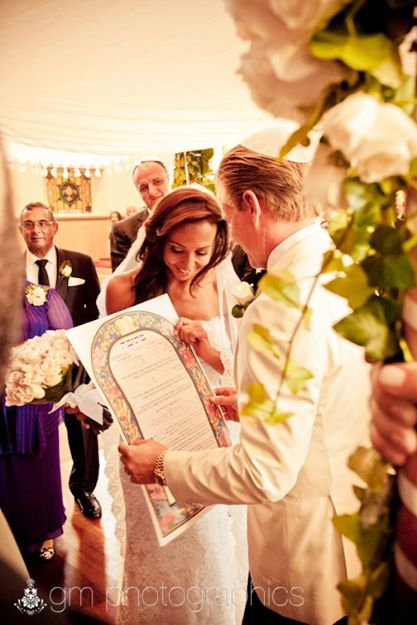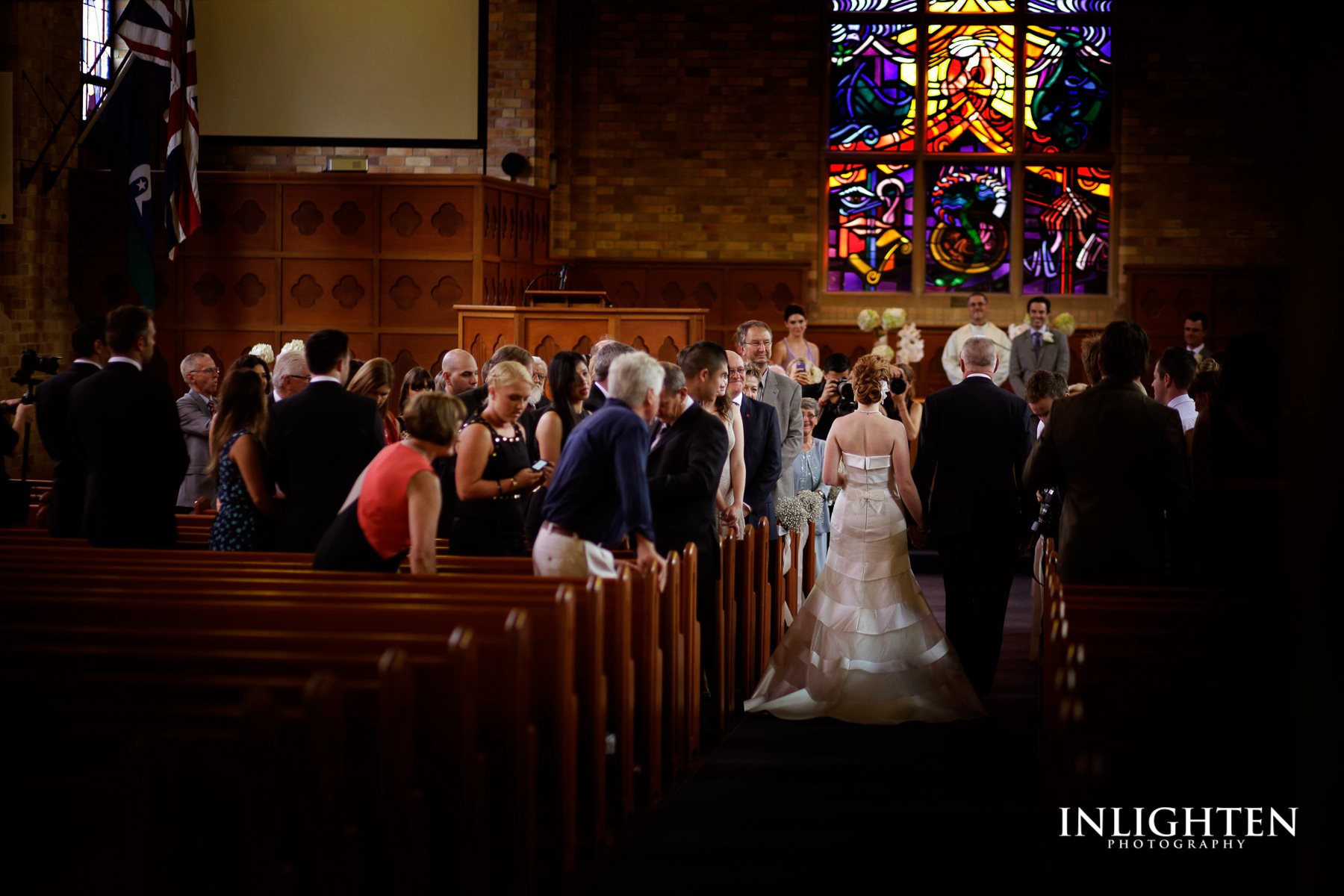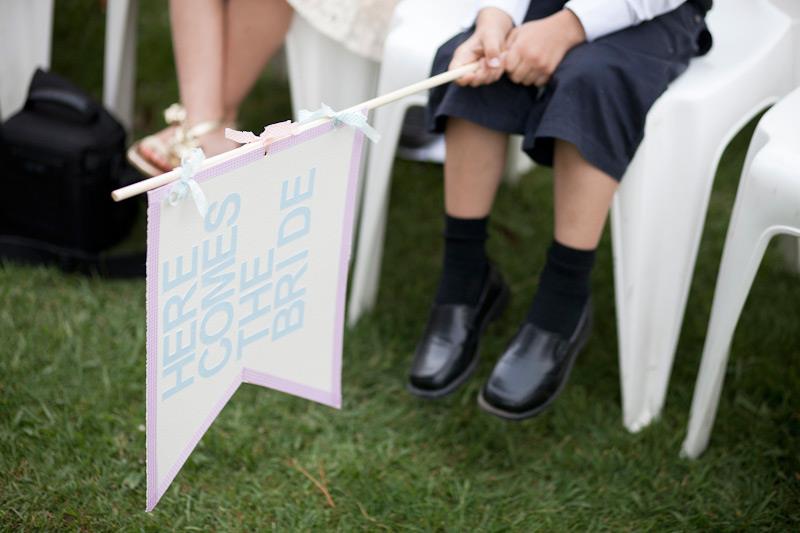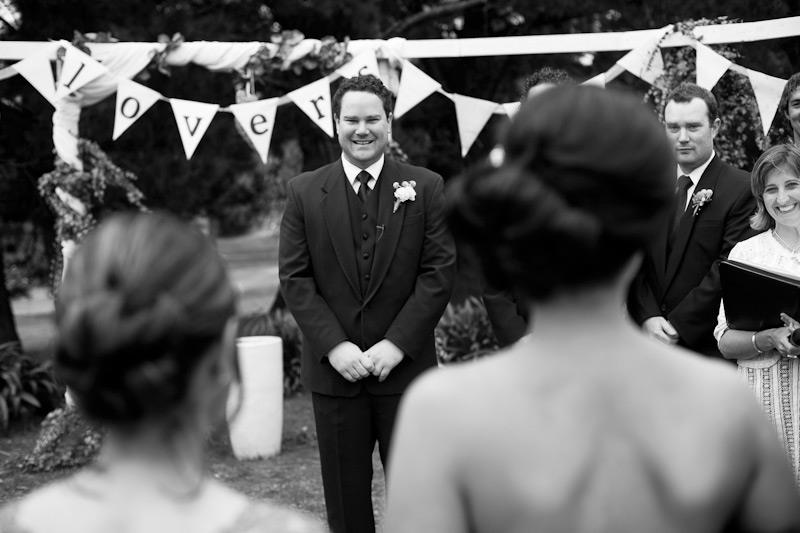Civil ceremonies have risen in popularity. Some couples still find themselves torn between deciding whether to hold their ceremony in a place of worship or whether they should skip the pomp and ceremony all together and go down the civil route. If you find yourself torn, check out some of the pros and cons below to help make your decision.

D’Leanne and Ashley get married at Emanual Synagogue, and host their reception afterward at Catalina Restaurant. Image courtesy GM Photographics.
The Religious Ceremony
Guests usually view the religious ceremony to be more formal and more spiritually moving than a civil event. If you are religious, but you don’t worship regularly it’s easy to appreciate why couples prefer marrying outside their religion, but if you are busy sitting on that fence trying to decide whether it’s right for you here are some considerations:
- Religious ceremonies tend to be more formal, usually because they are held by an ordained member of that affiliation. Their location alone usually demands more reverence than an outdoor public space.
- The religious ceremony is typically much longer than a 20 minute civil affair and may provide you with more opportunity to make it your own spiritually with prayer, song and other ceremony.
- Some religions have rules about who they will and will not marry and may require their couples to take pre-marital counseling before allowing them to be married within their place of worship.
- Getting married inside a place of worship usually means that you don’t need to worry about the weather!
- Depending on the place of worship, you will usually need to donate or pay a fee to the venue as well as the representative marrying you. You may also need to pay additional fees for extra’s such as bell ringers (if you’re lucky enough to be marrying in a church with bells installed!) or cleaning fees.
- You may be limited by the amount of décor you wish to install on the wedding day itself. If you have your heart set on a floral arbor for example, make sure your place of worship is happy for your florist to come along on the day and install it! (Some of the larger, more historic churches may object to this).
- If you are a bride that is likely to run late and you’re getting married in a popular venue, some places of worship will not marry you if you are more than 15 minutes late, as they can run back to back weddings which can throw the schedule into chaos.
- Some places of worship may have some rules about leaving any floral arrangements within their facility once the ceremony is over. (Forget about taking them with you to the reception). On the flip side, if you are getting married along with several other couples on the same day, a representative from the place of worship may facilitate putting you all in contact together to share the costs of floral arrangements for the day.

PLC ChapelKelly & James get married at Pymble Ladies College (PLC) Chapel in Sydney. Image courtesy Inlighten Photography.
The Civil Ceremony
Civil ceremonies are so popular because couples can make what they want from them. Many couples hire us just to decorate and set up their ceremonial area (our short day packages are perfect for this). They can be held almost anywhere, and you have a vast selection of celebrants to choose from, none of whom care what your religious affiliations are!

Simmone & Cale get married outdoors at Sylvan Glen. Here comes the bride. Image courtesy Matt Johnson Photography.
If you are thinking about hosting a civil ceremony here are some points to consider:
- Even though you can choose your celebrant, there are a plethora of inexperienced celebrants on the scene since the Attorney General’s department has increased the cap on the number of authorised celebrants. Interviewing your celebrant is a must, and if you have the opportunity to view the celebrants “work” either in person or on film, you should take the opportunity.
- The celebrant will usually charge you a fee to perform the paperwork, prepare the ceremony and perform the ceremony on the day. They should also include a PA to ensure that they are audible. However that is usually the extent of it. Items such as any signing tables, chairs and any other décor need to be arranged separately at your expense. (This by the way, is an area our wedding planners specialise in – please get in touch to find out more!)
- If you choose an outdoor space for your wedding, then you will usually need to pay an additional fee for the venue if it is a public space – and you will need to consider your wet weather alternatives. But all is not lost, our Rainy Day Protection Program is just the answer, but it will mean more financial investment.
- With public spaces, it is usual for them to have some governance on what décor you can set up. Parks usually have some rules around the scattering of rose petals and how much furniture you can install (especially seating). They may also have specific rules about amplification, and catering. They will also usually have 2-3 hour booking windows for you to set up and take down any items for your ceremony – and may charge you extra if you need more time outside of this.
- A celebrant will marry you almost anywhere, it’s a great opportunity to utilize some more unusual spaces: what about on board a boat, in an art gallery, at a zoo or at a historic building.
- Civil ceremonies are usually more informal for a few reasons. They are usually around 20-30 minutes, most of the time not all guests are seated (due most of the time to park permits). If you’re wanting your ceremony to meld into your reception, they can be a great way to use the time to host a post ceremony reception with a light champagne service and some hors d’oeuvres (speak to us about booking one for you).
- If you have a particular theme in mind for your wedding (yes many celebrants will dress according to any customs, traditions or fun themes that you have in mind), or the bride’s side of the family speaks a different language to the groom’s side, the sky is the limit with finding the right celebrant, and you’re not limited by religious denomination.
There really is much to consider when deciding exactly how you should tie the knot. It can often be a difficult process fraught with much anxiety because of family expectations. Although the ultimate decision is yours and yours alone, it doesn’t hurt to have an empathetic ear to your family if problems do arise.

